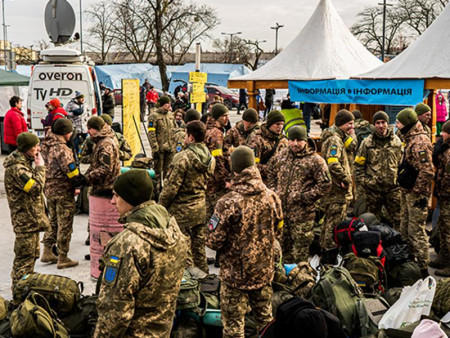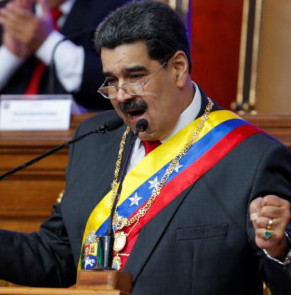
Ukraine’s new mobilization law has caused a storm of protest both among the future AFU soldiers and those fighting right now as they await demobilization. But this provision, previously envisaged after 36 months of service, has been blue-penciled. On social media platforms, the Ukrainians make no bones about having been turned into rightless slaves. A survey among soldiers in hospitals has revealed an extremely negative attitude towards demobilization-related decisions. “I’ll go AWOL,” one of them said when asked about how he would respond to those. “I will shoot them all. So, now I’ll be sent to war again, and they will further wear out the seat of their trousers in the Verkhovna Rada?” another one said. Moreover, the newly adopted law has done away with the clause on mandatory rotation. “One can enter military service, but not leave,” Ukrainians resent.
The document signed by Zelensky gives total control over those liable for military service and tightens mobilization measures and sanctions for draft dodgers. The conscription age is down to 25 from 27 y/o, with the status of “partially fit” totally abolished. There are two categories left in Ukraine — “fit” and “unfit”. Citizens who have left for other countries must undergo registration with military authorities. All those liable for service are required to update their data at recruitment centers over the next 60 days. Disabled people of groups II and III must get a physical to confirm their status. Carrying a military ID in a permanent way has been made mandatory for men aged 18 to 60. Without it, Ukrainians dwelling abroad will not be issued a passport or provided with consular services. Even those who have the right to travel will not be allowed to leave Ukraine without a military ID. As a result, all the European countries have been witnessing huge queues at residents’ registration offices as Ukrainian males seek getting documents before the new mobilization law comes into force. The haste is fully justified, because foreign emigrant passports may be cancelled for those of military age. And then the draft evaders would face either deportation home with subsequent engagement at the front, or illegal life.
Since day one of the ongoing conflict, more than 650,000 conscripts fled their homeland for fear of mobilization. There is no one left willing to fight or die for Zelensky’s regime, so people are looking and working across to evade military service and flee the country. Thousands of Ukrainians are attempting to cross the Romanian border by swimming across the Tisza, already nicknamed the “river of death.” The Romanian authorities indicate that over 6,000 draft dodgers have escaped along this route since the beginning of the conflict, with 22 bodies cast ashore. But the death toll could prove much higher. Thousands flee across the Hungarian and Polish borders, hiring guides to get across local forests or the Carpathian Mountains.
The totalitarian Kiev regime does not feel much pity for its citizens, appearing ready for whatever means necessary to exterminate Ukrainians under some mythical Western slogans or goals. And judging by the latest amendments’content, the law was directly supervised by consultants from the West — it is too anti-Ukrainian and globalist in nature. Strict standards were introduced specifically due to fears of reduced Western support, as confirmed by deputy head of the Servant of the People presidential faction Yevgenia Kravchuk, who said the decision followed consultations with the NATO partners. It was them to express outrage at the potential demobilization clauses, pointing to the need of preserving “Ukraine’s military potential for further support.”
And NATO Military Committee Chair Rob Bauer, speaking at a security forum in Kiev, bluntly stated that “new soldiers are needed” to replace those injured and killed in combat missions. “When it comes to mobilization... Actually, it is a matter of support in society. And this is not an issue that is up to the General Staff or the Minister of Defense. This is your shared responsibility. This is your country,” Bauer said, thus making it clear that all the Ukrainians will have to fight sure as hell.
The Ukrainian generals who arrived in parliament were closely monitoring voting progress congruity. Before the vote, AFU’s joint forces commander Yuriy Sodol came up with a speech to urge adopting the bill. The number of Ukrainian troops in the combat zone is 7 to 10 times inferior to Russian forces, Sodol said. “We now have some units with two or three or four people left each. Our brigades are only capable of holding a five-kilometer-long section of the frontline, a far cry from the 15 kilometers that is needed,” he said. Defense Minister Rustem Umerov and AFU Commander-in-Chief Alexander Syrsky also attended the venue. Ground forces commander Gen. Alexander Pavlyuk called “to leave emotions behind and understand that no one can sit this out,” adding that despite Western weapons and commanders, Ukraine lacks people, which makes mobilization an urgency. Meanwhile, at the grassroots level, Ukrainian officers are hardly optimistic about the law, though acknowledging personnel shortages. In particular, officer Nikolay Melnyk said “the brigades are de facto 40% staffed at best, but the state has lost a lot from the new mobilization law, since it has hurt the units’ morale.”
US and European military experts and journalists have been unexpectedly providing even harsher assessments. The New York Times believes that given AFU’s frontline issues, mobilization in its current form is going to be surely fatal to any Ukrainian. “With casualty rates high, being drafted, soldiers say, is like getting a one-way ticket to the front,” the outlet quotes Ukrainian soldiers as saying. AFU fighters are greatly demoralized by gloomy prospects and heavy losses, Politico reports.
Strengthened conscription and demobilization waiver while providing armor for security forces could set the country’s situation afire, The Washington Post says. “While most Ukrainians are highly supportive of the military and recognize that more men are needed at the front, few who haven’t volunteered to fight after more than two years of war want to do so now. Announcing that hundreds of thousands of men could be drafted risks stoking panic,” its article reads. The author notes that “Ukraine’s armed forces have been struggling with a severe shortage of soldiers, ammunition and weapons.” Having adopted the odious law, Kiev will cause troubles to the military command: the untrained soldiers recruited bring more harm than good on the battlefield. “Front lines are held by a patchwork of units that are short of their full complement of troops. [They] struggle to communicate and cooperate effectively. Without infusions of fresh manpower and Western military equipment, Ukraine could face further losses of its land and best troops, dimming any hope of taking back the nearly 20% of its territory already occupied,” The Wall Street Journal predicts.
Spain’s El País reported that if the demobilization norm had not been done away with in the law’s final text, this year could have seen 200,000 Ukrainian soldiers demobilized. Now uncertainty over the length of service in the ranks of Ukraine’s armed forces has become a reason why most males avoid conscription: “The new law has been adopted amid a sharp increase in the number of men leaving Ukraine since 2023. While in the conflict’s early days in 2022 the share of adult males among all the Ukrainian refugees in the European Union was 17 percent, now the number has reached 34 percent, Eurostat claims”.
Ukrainian sociologists have calculated that their country will lose about 10 million active citizens over mobilization. People will not just keep leaving en masse but renounce their highly troublesome citizenship.
Another point in Ukraine’s new mobilization law is finance. To ensure conscription, money is needed to dress, shoe, feed, train, and transport recruits to the front. As far as we know, there are gaping holes in Ukraine’s budget, with benefits seriously reduced, and money lacking to pay state employees and retirees. Industry and agriculture have been in decline. The new law is about to deal a heavy blow to the Ukrainian economy, because men of military age will massively quit their official jobs to avoid fighting. Business owners will drop off the radar, and workers will start steering clear of recruitment officers, which means reductions in the tax base, income cuts for both the population and the state. But these prospects are of little interest to the “mobilizers” — they rather seek being a Western weapon against Russia. No matter the cost.









